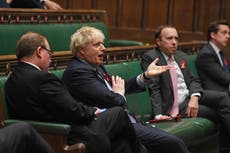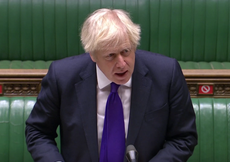Keir Starmer has discovered another price of abstaining – being left with nothing to ask at PMQs
The Labour leader might have profitably remained seated at points to allow a couple more backbenchers a rare turn to interrogate the prime minister, writes John Rentoul


Another argument against abstaining in House of Commons votes is that it makes it harder to ask tough questions of the government the next day. Keir Starmer’s decision to ask Labour MPs not to vote on the new tiered coronavirus regulations last night left him dangling like a punch bag in front of the prime minister today.
It would have been difficult to get past Boris Johnson’s slippery defences in any case, on the day that the British regulator approved the first vaccine in the world. “It is very important that people do not get their hopes up too soon,” said the prime minister, which can be roughly translated into normal English as: “We won; the naysayers opposite have lost; the next election is in the bag.”
There was nothing Starmer could do except to ask detailed practical questions. How will the government prioritise its top priority category, “residents in care homes for older adults and their carers”, given that they cannot all get it at the same time? And a question raised by the Welsh government (Labour): How are care homes going to get it if it has to be kept at an ultra-low temperature?
Detailed factual questions can be awkward for Johnson, who read out the first few priority categories on the list and then said, in effect, “It’s all written down somewhere and everyone can study it carefully at their leisure.” As for the Welsh fridges question, Johnson said: “He’s right to raise that particular logistical difficulty.”
Starmer was reduced to demanding “emergency legislation” to counter life-threatening misinformation about vaccines. It is not great when the opposition demands curbs on free speech, but fortunately all Johnson did was to burble ineffectually in reply, agreeing that anti-vaxxers are very bad.
At this point, the Labour leader might have profitably remained seated and allowed a couple more backbenchers a rare turn to interrogate the prime minister. Starmer does not have to use all his six questions, and stopping after four would have deprived Johnson of his prepared responses, most of which he saves up for his last two replies – and especially for his reply to Starmer’s sixth question, to which the leader of the opposition cannot respond.
Johnson’s rehearsed putdowns were not worth waiting for today, and yet they were still wounding. Starmer asked about job losses at Topshop and Debenhams, to which the prime minister replied that the government was doing “everything we can to restore the high streets of our country”. This included easing the lockdown as of today and bringing in a new regime of tiered restrictions that allows “non-essential” shops to reopen, but “neither he nor his troops could be bothered to vote for these sensible and balanced measures”, said Johnson.
Starmer unwisely defended his decision to abstain: “When I abstain I come to the House to explain; when he abstains he runs away to Afghanistan.” It is true that Johnson’s visit as foreign secretary to Kabul by which he avoided a vote for a third runway at Heathrow was one of his more embarrassing moments, and there have been many of those. But “he did it first” is not the best defence against the charge of indecision.
Johnson’s response was tediously formulaic: “Captain Hindsight is rising rapidly up the ranks and has become General Indecision.” Long pause. “He dithers; we get on with the job.” These were not edifying exchanges, but the fault lies with Starmer’s refusal to vote for measures with which he essentially agrees, even if he thinks they are not strict enough or do not come with enough financial support attached.
The problem with abstaining is that it looks like (a) playing games and (b) not leadership. And the third problem is that you end up at Prime Minister’s Questions the next day with nothing to ask.



Join our commenting forum
Join thought-provoking conversations, follow other Independent readers and see their replies
Comments